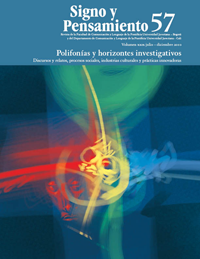Resumo
Así como la moderna sociedad del Estado-nación implicó un quiebre profundo con las anteriores formas de organización política, económica y cultural de la comunidad tradicional, y en las que estaban basadas las culturas locales, la sociedad global también introduce ahora fuertes rupturas con la sociedad nacional, pues “el globo ha dejado de ser una figura astronómica para adquirir plenamente significación histórica” (Ianni, 1996).
Appadurai, A. (2000), “Grassroots Globalization and the Research Imagination”, Public Culture, núm. 30, Duke University Press, p. 7.
— (2001), La modernidad desbordada. Dimensiones culturales de la globalización, Buenos Aires, Trilce/f.c.e.
Barganza, J. A. y Cruz, M. T. (2001), Critica das logacoes na Era da Técnica, Porto, Tropismos.
Beck, U. (2005), La mirada cosmopolita, Barcelona, Paidós.
Chartron, G. (1994), Pour Une nouvelle economie du savoir, París, Presses Universitaires de Rennes.
Dede, C. (comp.) (2000), Aprendiendo con tecnología, Barcelona, Paidós.
Echeverría, J. (1999), Los señores del aire, telépolis y el tercer entorno, Barcelona, Destino.
Finquelevich, S. (coord.) (2000), ¡Ciudadanos a la red! Los vínculos sociales en el ciberespacio, Buenos Aires, Ciccus/La Crujía.
Fischer, H. (2001), Le Chock numerique. A l’aube de une nouvelle civilisatuon, Montreal, BLV.
Habermas, J. (1989), Teoría de la acción comunicativa, Madrid, Tauros.
Harvey, D. (1989), “The experience of space and time”, The Condition of Postmodernity, Cambridge, Basil Blackwell.
Heidegger, M. (1997), Filosofía, ciencia y técnica, traducción de Soler, F. y Acevedo, J., Santiago de Chile, Editorial Universitaria.
Ianni, O. (1996), Teorías de la globalización, México, Siglo xxi. Laclau, E. (1996), Emancipación y diferencia, Buenos Aires, Ariel.
Lahire, B. (2004), La Culture des individus. Dissonances culturelles et distinction de soi, París.
Lévi, P. (1996), “Essai Sur la cyberculture: l’universel sans totalité”, Rapport au Conseil de L’Europe, París, p. 4.
— (1998). A inteligência coletiva. Sao Paulo, Loyola.
Maigret, E. y Macé, E. (2005), Pensar les mediacultures. Nouvelles practique et nouvelles appriches de la representation du monde, París, Armand Collin.
Manzini, E. (1991), Artefacts. Vers une nouvelle écologie de l'environement artificiel, París, cgp.
Meyrowitz, J. (1985), No Sense of Place. The Impact of Electronic Media on Social Behavior, Nueva York, Oxford University Press.
Mignolo, W. (comp.) (2001), Capitalismo y geopolítica del conocimiento, Buenos Aires, Signo.
Molina, J. L. (2001), El análisis de redes sociales: una introducción, Barcelona, Bellaterra.
Ortiz, R. (1994), Mundializaçao e cultura, Sao Paulo, Brasiliense.
Santos, M. (1993), “Espaço, mundo globalizado, post-modernidade”, en Margen, núm. 1, p. 11.
— (1996), A natureza do espaço, Sao Paulo, Hucitec.
— (2000), Por uma outra globalizacao, Río de Janeiro, Record.
Scolari, C. (2004), Hacer clic. Hacia una sociosemiótica de las interacciones digitales, Barcelona, Gedisa.
Serres, M. (1995), Atlas, Madrid, Cátedra. — (2001), Hominescence, París, Le Pommier.
Tirado Serrano, F. y Domenech, M. (ed.) (2006), Lo social y lo virtual: nuevas formas de control y transformación social, Barcelona, uoc.
Varios autores (2002), Redes, gestión y ciudadanía, Quito, oclac-abyayala.
Wiewiorka, M. (1997), Une Societé fragmentée? Le multiculturalisme en débat, París, La Decouverte.
Winocourt, R. (2002), Ciudadanos mediáticos, Barcelona, Gedisa.
Esta revista científica se encuentra registrada bajo la licencia Creative Commons Reconocimiento 4.0 Internacional. Por lo tanto, esta obra se puede reproducir, distribuir y comunicar públicamente en formato digital, siempre que se reconozca el nombre de los autores y a la Pontificia Universidad Javeriana. Se permite citar, adaptar, transformar, autoarchivar, republicar y crear a partir del material, para cualquier finalidad (incluso comercial), siempre que se reconozca adecuadamente la autoría, se proporcione un enlace a la obra original y se indique si se han realizado cambios. La Pontificia Universidad Javeriana no retiene los derechos sobre las obras publicadas y los contenidos son responsabilidad exclusiva de los autores, quienes conservan sus derechos morales, intelectuales, de privacidad y publicidad.
El aval sobre la intervención de la obra (revisión, corrección de estilo, traducción, diagramación) y su posterior divulgación se otorga mediante una licencia de uso y no a través de una cesión de derechos, lo que representa que la revista y la Pontificia Universidad Javeriana se eximen de cualquier responsabilidad que se pueda derivar de una mala práctica ética por parte de los autores. En consecuencia de la protección brindada por la licencia de uso, la revista no se encuentra en la obligación de publicar retractaciones o modificar la información ya publicada, a no ser que la errata surja del proceso de gestión editorial. La publicación de contenidos en esta revista no representa regalías para los contribuyentes.


